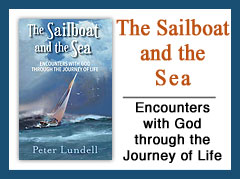
4. Meditate
•Listening to God can happen anywhere at any time, but it is most often done through meditation. Because of the Enlightenment Period’s influence on Western civilization, including the church, meditation has been held in disrepute both inside and outside the church—until the present-day interest in spirituality. Because the church has so neglected meditation, it’s no surprise that many people have turned to Eastern meditation practices. What a tragedy!
•Christian history before the eighteenth century boasted lineups of people who practiced and wrote on meditation and intimacy with God. They took seriously the Bible’s exhortations to meditate. Most of the medieval mystics were doing what the Bible told them—and us—to do: God told Joshua to “meditate” on his Word “day and night” (Joshua 1:8). In the Psalms we read: “We meditate on your unfailing love” (48:9), and “I will meditate on all your works” (77:12).
•Unlike Eastern mysticism, Christian meditation is the practice of clearing our minds of clutter and focusing on God, giving him exclusive attention as we yield ourselves to his Word and his Spirit’s prompting. We receive God’s presence at the deepest, even subconscious, levels of our being, as he forms his character in us.

5. Practice God’s Presence
•Practicing God’s presence means to be consciously aware of God’s immediate presence in your life here and now, consistently through the day. It’s difficult to do this perfectly, but we can all be more aware. Here are some ways:
•Your last though before sleeping and first thought when awaking is of the Lord.
•Through the busyness of the day, remembering that God is there with you. Acknowledge that he is present with you as you go about your business.
•When you get mad or stressed, try to see things from God’s perspective and put frustrations or concerns in his hands.
•When lonely or depressed, turn to prayer and invite God into your sadness.
•When waiting for someone, use that time to pray.
•Do menial tasks with an awareness of God and a of love toward God.
•Have a praise song on your mind as you go through the day.

6. Be aware of God’s fingerprints in the natural world
•In studying the universe, astrophysicist Hugh Ross finds thirty-five parameters that are necessary for any kind of life to exist. These parameters of masses, ratios, distances, forces, and energy levels on the cosmic scale fall within hair-thin narrow ranges necessary for any kind of life to exist anywhere. In looking at our own galaxy, sun, earth, and moon, he finds an additional sixty-six similarly narrow parameters for the existence of earthly life as we know it. The chances of these parameters happening anywhere else in the universe are astonishingly small.
•Quantum physics, the most subatomic, smallest degree at which we can analyze the natural world, opens a bizarre realm that defies almost everything we think we know about the natural world. Nothing is static or predictable. Particles aren’t even particles, and everything is a blur of possibilities—more like concentrated bits of information than anything physical. Theorists conjecture that, because things break down or morph when not observed, the whole natural world may hold together because it is under the watch of an “Ultimate Observer.”
•DNA contains the genetic instructions that direct the nucleus of every living cell. A set of human chromosomes contains as many as three billion codes, a more tightly packed, complex set of information than anywhere else in the universe. DNA directs and makes every living cell an exact part of the living thing it becomes or maintains. To do that, it includes a jaw-droppingly intricate system for self-replication. And the information of the DNA is independent from the structure. That means it did not—and could not—have randomly evolved. Someone carefully created our DNA.

7. Connect with others who know God well
•Have you ever met or known a mature Christian who loves God and lives in a way that touches others with that love and changes them? When you’re around that person do you feel uplifted? Encouraged? Challenged?
•Actively search for and process the ways such a person positively influences you. Do you feel more drawn to, or closer to, God?
•Connect with such people as often or as regularly as you can.

8. Study and compare the reliability of the Bible
•I encourage you to test the reliability of the Bible. I did, and my faith is incalculably stronger because I did.
•Some highlights: The creation account (remember that it’s from the point of view of the earth’s surface) aligns perfectly with science. Verses like Job 36:27–28 describe the water cycle, and Isaiah 40:22 indicate the earth was circular, not flat—thousands of years before such things were discovered. The Bible has more archeological evidence than all the other holy books combined. The statistical probability of prophecies of Christ being fulfilled as they were is infinitesimally small. As the New Testament was copied, the variance of error was vastly minute compared to copies of any other text. Of all the holy books of world religions, the Bible is the most brutally honest book—both with its characters and with us.
•Consider that the Bible is the only holy book that deals realistically with the world and the human condition. It does not essentially say that if people fulfill a certain ritual or obligation they can save themselves or secure paradise, nirvana, or whatever is promised. It is honest about the depravity we’re in and about the radical solution that is beyond our own ability to attain.
•Jesus claimed to be the way, the truth, and the life and that we cannot truly connect with God the Father except through him.

9. Get involved in ministry to others
•Serving others saves us from ourselves—from indifference, criticism, and self-absorption.
•Ministry to others puts us in the position Jesus would take if he were here in person.
•Jesus equates our ministering to others with ministering to him.
•When we minister to others, we see, think, and feel more as God does. We depend on God in the process. And we feel the joy of doing this. All this increases our connection with God.

•Many people attain impressive achievements and maybe live exemplary lives, and we would probably like them as well. But now their lives are over, and the questions are finally asked: Where was God in their lives? Now it’s too late. What will they do in eternity?
•Many people keep to their own self-contained, self-interested lives, and when they die, little can be said about them except that they were nice people. Beyond immediate family and friends, it’s as if they never lived at all. How sad.
•Some people live as followers of Christ and have eternity in their hearts. They are a blessing to others, and when they’re gone, they’re upgraded to a heavenly reward. Those of us left behind are blessed to live in their legacy.
•Reflect on the three types of people mentioned above—or others. What do you learn? What positive influence can each make in your faith and how you live your life?








